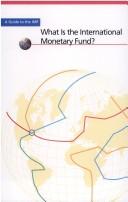| Listing 1 - 9 of 9 |
Sort by
|

ISBN: 1557759200 Year: 2001 Publisher: Washington IMF
Abstract | Keywords | Export | Availability | Bookmark
 Loading...
Loading...Choose an application
- Reference Manager
- EndNote
- RefWorks (Direct export to RefWorks)
Monetary policy. --- International finance. --- Politique monétaire --- Finances internationales --- International Monetary Fund. --- 339.732 --- AA / International- internationaal --- 333.432.8 --- 332.152 --- 339.732 Ida. Ibrd. Bird. Ifc. Imf. Speciale trekkingsrechten. Bank voor internationale betalingen. Internationaal monetair systeem --- 339.732 Internationale banken. Wereldbank. Ontwikkelingsbank. Investeringsbank. Comecom, samenwerkingsbank. Europees monetair fonds. Europees ontwikkelingsfonds. Europese investeringsbank. Europese monetaire --- Ida. Ibrd. Bird. Ifc. Imf. Speciale trekkingsrechten. Bank voor internationale betalingen. Internationaal monetair systeem --- Internationale banken. Wereldbank. Ontwikkelingsbank. Investeringsbank. Comecom, samenwerkingsbank. Europees monetair fonds. Europees ontwikkelingsfonds. Europese investeringsbank. Europese monetaire --- Internationale monetaire organisatie. Internationaal Muntfonds. Algemene leningovereenkomsten. --- International Monetary Fund --- Internationaal monetair fonds --- International monetary fund --- IMF. --- Internationale monetaire organisatie. Internationaal Muntfonds. Algemene leningovereenkomsten
Book
ISBN: 1475598181 Year: 2014 Publisher: International Monetary Fund
Abstract | Keywords | Export | Availability | Bookmark
 Loading...
Loading...Choose an application
- Reference Manager
- EndNote
- RefWorks (Direct export to RefWorks)

Abstract | Keywords | Export | Availability | Bookmark
 Loading...
Loading...Choose an application
- Reference Manager
- EndNote
- RefWorks (Direct export to RefWorks)
339.732
Book
ISBN: 1462371426 Year: 2004 Publisher: [Place of publication not identified] International Monetary Fund
Abstract | Keywords | Export | Availability | Bookmark
 Loading...
Loading...Choose an application
- Reference Manager
- EndNote
- RefWorks (Direct export to RefWorks)
Medical economics --- International finance --- Finance --- Economic assistance --- Public Health --- Health & Biological Sciences --- Medical Economics --- Economic aid --- Foreign aid program --- Foreign assistance --- Grants-in-aid, International --- International economic assistance --- International grants-in-aid --- Economic policy --- International economic relations --- Conditionality (International relations) --- Funding --- Funds --- Economics --- Currency question --- International monetary system --- International money

ISBN: 1589063414 Year: 2004 Publisher: Washington, D.C. : International Monetary Fund,
Abstract | Keywords | Export | Availability | Bookmark
 Loading...
Loading...Choose an application
- Reference Manager
- EndNote
- RefWorks (Direct export to RefWorks)
Medical economics --- Medical economics --- International finance --- Finance --- Economic assistance --- Economie de la santé --- Economie de la santé --- Finances internationales --- Finances --- Aide économique

ISBN: 1589065719 1455248908 9786613850201 1452760446 1451936443 1283537753 9781451936445 9781589065710 9781455248902 9781452760445 9781283537759 6613850209 Year: 2007 Publisher: Washington, D.C.
Abstract | Keywords | Export | Availability | Bookmark
 Loading...
Loading...Choose an application
- Reference Manager
- EndNote
- RefWorks (Direct export to RefWorks)
Assiduously tracking the trends and consequences of globalization, the IMF's quarterly magazine Finance & Development has been a major forum for discussing-and dissecting-the policy options and challenges faced by governments in an era when many national decisions transcend borders. This valuable compilation of articles published over the past eight years focuses on financial globalization, including the policy implications of the huge growth in cross-border capital flows. Articles also look at the expansion of world trade, explore the impact of globalization on jobs, taxation, and the poor, and examine the digital divide between developed and some developing countries. An extraordinary summary that distills nearly a decade of accelerated change.
International finance --- Economic assistance --- Globalization --- Finance --- International Finance --- Business & Economics --- 332.042 --- Global cities --- Globalisation --- Internationalization --- International relations --- Anti-globalization movement --- International monetary system --- International money --- International economic relations --- International finance. --- Globalization. --- Exports and Imports --- Finance: General --- Macroeconomics --- Social Services and Welfare --- General Financial Markets: General (includes Measurement and Data) --- Current Account Adjustment --- Short-term Capital Movements --- International Investment --- Long-term Capital Movements --- Government Policy --- Provision and Effects of Welfare Program --- Aggregate Factor Income Distribution --- International economics --- Social welfare & social services --- Capital flows --- Emerging and frontier financial markets --- Capital account liberalization --- Income inequality --- Balance of payments --- Financial markets --- National accounts --- Poverty --- Capital movements --- Financial services industry --- Income distribution --- United States
Book
ISBN: 1455283185 1455224332 1283537893 9786613850348 1455242527 9781455242528 Year: 2009 Publisher: Washington, D.C. International Monetary Fund
Abstract | Keywords | Export | Availability | Bookmark
 Loading...
Loading...Choose an application
- Reference Manager
- EndNote
- RefWorks (Direct export to RefWorks)
Recovery from the deepest recession in 60 years has started. But sustaining it will require delicate rebalancing acts, both within and across countries. IMF chief economist Olivier Blanchard writes in our lead article that the turnaround will not be simple. The crisis has left deep scars that will affect both supply and demand for many years to come. This issue of F&D also looks at what’s next in the global crisis and beyond. We look at ways of unwinding crisis support, the shape of growth worldwide after the crisis, ways of rebuilding the financial architecture, and the future of reserve currencies. Jeffrey Frankel examines what’s in and what’s out in global money, while a team from the IMF’s Research Department looks at what early warning systems can be expected to deliver in spotting future problems. In our regular People in Economics profile, we speak to Nobel prize winner Daniel Kahneman, whose work led to the creation of the field of behavioral economics, and our Picture This feature gives a timeline of how the Bank of England’s policy rate has fallen to its lowest level in 300 years. Back to Basics gives a primer on monetary policy, and Data Spotlight looks at how the crisis has affected the eastern European banking system.
Economic stabilization -- International cooperation. --- Finance. --- International finance. --- Banks and Banking --- Financial Risk Management --- Macroeconomics --- Money and Monetary Policy --- Social Services and Welfare --- Industries: Financial Services --- Exports and Imports --- Monetary Systems --- Standards --- Regimes --- Government and the Monetary System --- Payment Systems --- Financial Crises --- Banks --- Depository Institutions --- Micro Finance Institutions --- Mortgages --- Government Policy --- Provision and Effects of Welfare Program --- Financing Policy --- Financial Risk and Risk Management --- Capital and Ownership Structure --- Value of Firms --- Goodwill --- General Financial Markets: General (includes Measurement and Data) --- Foreign Exchange --- Economic & financial crises & disasters --- Monetary economics --- Banking --- Labour --- income economics --- Finance --- Investment & securities --- Financial crises --- Currencies --- Early warning systems --- Labor --- Money --- Current account surpluses --- Balance of payments --- Banks and banking --- Poverty --- Crisis management --- Foreign exchange --- United States
Book
ISBN: 9781455289950 1455289957 1455299332 1455265705 128284511X 9786612845116 1451953682 Year: 2009 Publisher: Washington, D.C. International Monetary Fund
Abstract | Keywords | Export | Availability | Bookmark
 Loading...
Loading...Choose an application
- Reference Manager
- EndNote
- RefWorks (Direct export to RefWorks)
Crisis Stalls Globalization: Reshaping the World Economy" examines the multiple facets of the recession-from the impact on individual economies to the effect on the global payments imbalances that were partially at the root of the crisis-and offers a variety of suggestions for supporting a recovery and averting future crises. Several IMF studies shed light on the depth of the crisis-including a survey of the sharp drop in trade finance, along with quantitative findings about the direct and indirect costs of the financial turbulence-and debate what is to be done from several angles, including the redesign of the regulatory framework and ways to plug large data gaps to prevent future crises and aid in the creation of early warning systems. Opinion pieces discuss the shifting boundaries between the state and markets, the agenda for financial sector reform, and the governance of global financial markets. The issue also includes a historical perspective to see when restructuring the global financial architecture actually succeeds. "People in Economics" profiles Nouriel Roubini; "Back to Basics" looks at what makes a recession; and "Data Spotlight" examines Latin America's debt.
Business. --- Economic stabilization -- International cooperation. --- International finance. --- Banks and Banking --- Exports and Imports --- Financial Risk Management --- Macroeconomics --- Public Finance --- Finance: General --- Macroeconomic Aspects of International Trade and Finance: General --- Debt --- Debt Management --- Sovereign Debt --- Financial Crises --- Banks --- Depository Institutions --- Micro Finance Institutions --- Mortgages --- General Financial Markets: General (includes Measurement and Data) --- International Investment --- Long-term Capital Movements --- International economics --- Finance --- Labour --- income economics --- Public finance & taxation --- Economic & financial crises & disasters --- Trade finance --- Financial crises --- Banking --- Public debt --- Emerging and frontier financial markets --- International trade --- Financial markets --- Economic recession --- Economic growth --- International finance --- Debts, Public --- Banks and banking --- Fiscal policy --- Financial services industry --- United States
Book
ISBN: 9781455209231 1455209236 1455297313 1455222313 1282845128 9786612845123 1451953712 Year: 2009 Publisher: Washington, D.C. International Monetary Fund
Abstract | Keywords | Export | Availability | Bookmark
 Loading...
Loading...Choose an application
- Reference Manager
- EndNote
- RefWorks (Direct export to RefWorks)
'Crisis Shakes Europe: Stark Choices Ahead' looks at the harsh toll of the crisis on both Europe's advanced and emerging economies because of the global nature of the shocks that have hit both the financial sector and the real economy, and because of Europe's strong regional and global trade links. Marek Belka, Director of the IMF's European Department, writes in our lead article that beyond the immediate need for crisis management, Europe must revisit the frameworks on which the European Union is based because many have been revealed to be flawed or missing. But in many respects, one key European institution has proved its mettle—the euro. Both Charles Wyplosz and Barry Eichengreen discuss the future of the common currency. Also in this issue, IMF economists rank the current recession as the most severe in the postwar period; John Lipsky, the Fund's First Deputy Managing Director, examines the IMF's role in a postcrisis world; and Giovanni Dell'Ariccia assesses what we have learned about how to manage asset price booms to prevent the bust that has caused such havoc. In addition, we talk to Oxford economist Paul Collier about how to help low-income countries during the current crisis, while Donald Kaberuka, President of the African Development Bank, writes about how African policymakers can prepare to take advantage of a global economic recovery. 'Picture This' looks at what happens when aggressive monetary policy combats a crisis; 'Back to Basics' gives a primer on fiscal policy; and 'Data Spotlight' takes a look at the recent large swings in commodity prices.
Business. --- Finance. --- International finance. --- Banks and Banking --- Financial Risk Management --- Macroeconomics --- Money and Monetary Policy --- Public Finance --- Banks --- Depository Institutions --- Micro Finance Institutions --- Mortgages --- Monetary Systems --- Standards --- Regimes --- Government and the Monetary System --- Payment Systems --- Fiscal Policy --- General Financial Markets: General (includes Measurement and Data) --- Financial Crises --- Banking --- Monetary economics --- International economics --- Economic & financial crises & disasters --- Finance --- Currencies --- Financial crises --- Fiscal policy --- Fiscal stimulus --- Money --- Commercial banks --- Financial institutions --- Banks and banking --- Prices --- Foreign exchange --- United States
| Listing 1 - 9 of 9 |
Sort by
|

 Search
Search Feedback
Feedback About
About Help
Help News
News